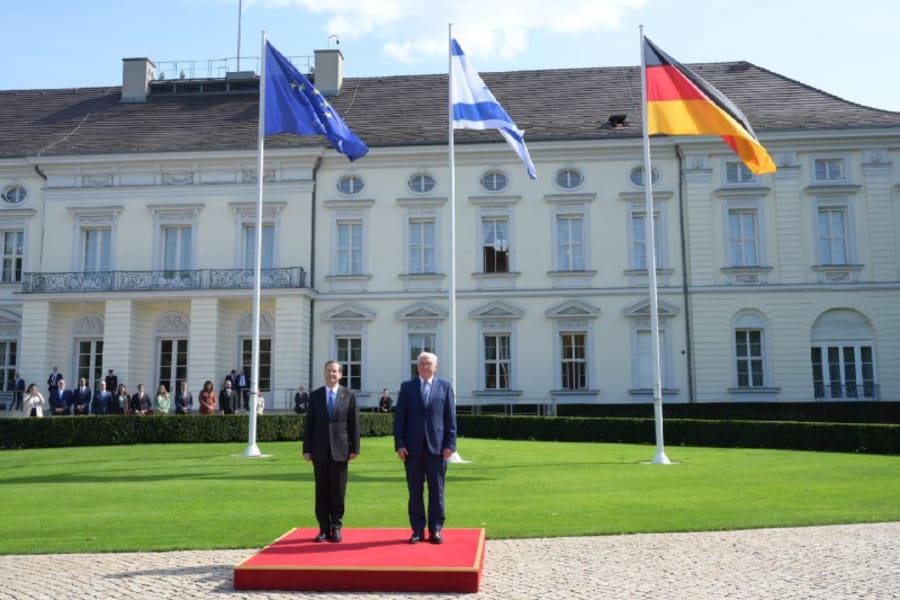More Israelis feel positive toward Germany than Germans do toward Israel
Survey questions show nationality, age shape views on Holocaust education, Israeli policies

A newly published survey to assess how Germans feel about Israel showed that, last year, more Israelis had positive feelings about Germany than Germans had positive feelings about Israel.
The independent Bertelsmann Foundation conducted the poll online, surveying 1,270 Germans and 1,370 Israelis in Germany.
The results were released as Israel’s President Isaac Herzog headed to Germany on an official state trip which will include a will to the Memorial to the Murdered Jews of Europe in Berlin and Bergen-Belsen concentration camp. Herzog will also meet with Holocaust survivors and local youth and talk about the significance of preserving history.
Among the respondents, 63% of the Israelis felt positively about Germany, while 19% had a poor view of Germany. Among the Germans, 46% felt positively about Israel, while 34% noted having a poor view of Israel.
A 62% majority of German respondents disagreed with the idea that Jews “have too much influence in the world,” yet, conversely, almost 1 in 4 (24%) agreed with the sentiment.
The Bertelsmann Foundation noted that younger Germans show a “profound historical awareness” and a lesser likelihood to harbor anti-Semitic attitudes. A large majority of German respondents, 82%, agreed that “Jews naturally belong in Germany,” with 13% disagreeing and 5% saying they do not know.
Study leader Joachim Rother has interpreted the poll to show “a demonstrable connection between education and anti-Semitic prejudices,” and said, “We are urgently required to invest even more in educational work and enlightenment in the future.”
While 40% of respondents disagreed with the statement that “what the State of Israel is doing to the Palestinians today is in principle no different than what the Nazis in the Third Reich did to the Jews,” another 36% agreed on some level with the statement, and a quarter of respondents said they did not know.
Only 23% of German respondents, overall, expressed a positive view of Israel’s government, while among young Germans – aged 18 through 29 – only 15% had a positive view of Israel’s government.
The Bertelsmann poll reportedly sought to look at respondents’ views on the others’ country, the extent of bias among Germans, and the role of the Holocaust in current relations and education.
When asked about the statement, “Almost 80 years after the end of the Second World War, we should no longer talk so much about the persecution of the Jews under the Nazis, but finally put the past behind us,” 49% of Germans agreed and 33% of Germans disagreed. Among Israelis, 60% agreed and 14% disagreed.
The terms “so much” and “finally” are modifiers that cloud a more explicit understanding of these views, because they indicate disparities in perspectives on the quantity or extent of engagement in Holocaust education, not simply views on Holocaust education itself.
Among German respondents, 68% of Germans agree to some extent with the sentiment that Germany “has a special responsibility for the Jewish people,” in contrast to 58% of Israelis.
Furthermore, 56% of Germans said that they thought cooperation between the two countries is a positive thing and 53% of Germans said they think cooperation should become even stronger. Among the Israeli respondents in the Germany-based poll, 68% praised Israeli-German cooperation and 78% believed cooperation between the two countries should be strengthened.
“Much has been achieved for German-Israeli relations in recent decades,” Rother said. “An intensive examination of the different perspectives and realities of life is indispensable. Direct encounters in the form of dialogue and cooperation can be particularly helpful here.”

The All Israel News Staff is a team of journalists in Israel.














